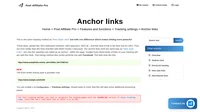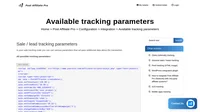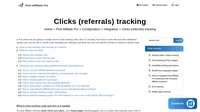What is a Tracking URL?
A tracking URL is a specialized web link designed to monitor and evaluate the performance of marketing campaigns. It incorporates tracking codes or parameters that allow marketers to analyze user interactions with the link. Tracking URLs are pivotal for understanding the journey a user takes to reach a website, including where the traffic originates, which advertisement or piece of content prompted the visit, and the effectiveness of various marketing channels in driving user actions. These URLs are especially crucial in affiliate marketing, where accurately attributing conversions to the right affiliate partners determines fair compensation and program success.
Tracking URLs provide the following benefits:
- Comprehensive Analytics: They allow businesses to gather detailed data on user activity and conversion paths.
- Campaign Effectiveness: Marketers can assess which strategies yield the best results and allocate resources accordingly.
- Cost Efficiency: By identifying high-performing channels, brands can optimize their marketing spend.

Importance in Affiliate Marketing
In affiliate marketing, tracking URLs are indispensable tools for ensuring transparency and accountability. They allow marketers to trace each click, sale, or conversion back to the responsible affiliate, ensuring that affiliates are rewarded accurately for their contributions. This precise attribution is crucial for maintaining trust within the affiliate network and optimizing marketing strategies.
Key Benefits:
- Accurate Attribution: Ensures affiliates are correctly compensated based on their performance, fostering trust and collaboration.
- Performance Analysis: Helps brands and affiliates pinpoint which links or campaigns are driving the most traffic and conversions.
- Optimization Opportunities: Provides data to refine marketing tactics, focusing on channels that deliver the best return on investment (ROI).
According to Awin, affiliate link tracking offers invaluable insights into the effectiveness of online activities, helping brands determine which elements are most successful in generating traffic and conversions (Awin, 2022).
How Tracking URLs Work
Tracking URLs operate by appending Urchin Tracking Module (UTM) parameters to a standard URL. These parameters contain specific details about the source, medium, and campaign associated with the link, allowing for granular tracking of user interactions. For instance, a typical tracking URL might look like this:
https://www.example.com/product?utm_source=google&utm_medium=cpc&utm_campaign=spring_sale
UTM Parameters Explained:
- utm_source: Indicates the origin of the traffic (e.g., Google, Facebook).
- utm_medium: Describes the marketing medium (e.g., email, CPC).
- utm_campaign: Identifies the campaign name to distinguish between different marketing efforts.
- utm_content: Differentiates between various ads or links that lead to the same URL.
- utm_term: Used primarily for paid search to specify the keywords triggering ads.
This system enables marketers to track the effectiveness of their marketing initiatives with precision, making data-driven decisions to enhance campaign outcomes (DashThis, 2023).
Building Tracking URLs
Creating a tracking URL is a straightforward process that can be accomplished using several tools and platforms. These tools allow marketers to define UTM parameters and generate a customized tracking link, facilitating accurate performance tracking.
Steps to Create a Tracking URL:
- Choose a Base URL: This is the primary link you wish to monitor.
- Add UTM Parameters: Define parameters like source, medium, and campaign to provide context for the traffic.
- Generate the URL: Use a tool to append these parameters to your base URL, creating a unique tracking link.
Marketing platforms like Google’s Campaign URL Builder or HubSpot simplify this process, allowing for seamless integration into broader marketing strategies.
Tools for Tracking URL Creation and Analysis
Numerous tools exist to assist marketers in creating, managing, and analyzing tracking URLs. These tools not only streamline the URL generation process but also offer comprehensive analytics to evaluate their performance.
Popular Tools:
- Google Analytics: Provides robust analytical capabilities to track traffic sources and user behavior.
- HubSpot: Offers tools for creating tracking URLs and integrating them into marketing campaigns for enhanced tracking.
- Bitly: Not only shortens URLs for easier sharing but also tracks clicks and performance metrics.
- WhatConverts: Focuses on lead tracking and attribution, offering detailed data on marketing effectiveness.
These tools enable marketers to harness the full potential of tracking URLs, ensuring that their marketing efforts are both efficient and effective (DashThis, 2023).
Challenges and Considerations
While tracking URLs offer significant benefits, they also present certain challenges, particularly with regard to privacy regulations and technological advancements.
Common Challenges:
- Privacy Concerns: Regulations such as GDPR impact how data can be collected and used, necessitating strict compliance.
- Cookie Restrictions: With increasing privacy measures, reliance on cookies for tracking is diminishing, prompting a shift towards cookieless tracking solutions.
- Affiliate Fraud: Ensuring the integrity of tracking data is crucial to prevent fraudulent activities within affiliate networks.
Marketers must navigate these challenges to maintain the efficacy of their tracking efforts while respecting user privacy and data integrity (Impact.com, 2023).
Future of Tracking URLs in Affiliate Marketing
As digital marketing evolves, the methods and technologies behind tracking URLs will continue to advance. The focus is likely to shift towards more sophisticated, privacy-compliant tracking solutions that offer deep insights into marketing performance while respecting user privacy.
Trends to Watch:
Integration with AI: Leveraging artificial intelligence to analyze tracking data more effectively and provide actionable marketing insights.
Cookieless Tracking: As browsers phase out third-party cookies, alternative tracking methods like server-side tracking and fingerprinting are gaining traction.
Enhanced Attribution Models: Moving beyond last-click models to more comprehensive attribution frameworks that consider multiple touchpoints in the customer journey.
Frequently Asked Questions
How does a tracking URL work?
A tracking URL is a special URL that contains tracking information. This information allows you to track the performance of your ad or campaign.
How can I create tracking URLs?
Tracking URLs can be created manually or through a URL generator.
Why should you use tracking URLs?
There are many reasons to use tracking URLs such as tracking the performance of campaigns, understanding how users interact with your site, and identifying where your website traffic is coming from.
The leader in Affiliate software
Post Affiliate Pro offers a comprehensive affiliate software platform to manage multiple affiliate programs with ease. Enjoy no setup fees, 24/7 customer support, and a free 1-month trial. Ideal for small and large businesses, it features precise tracking, automated workflows, and customizable tools to boost your affiliate marketing success. Try it now and streamline your affiliate operations effortlessly!
Discover Post Affiliate Pro's flexible pricing plans tailored to fit your business needs, with options for Pro, Ultimate, and Network packages. Enjoy a free trial with no credit card required, no setup fees, and the freedom to cancel anytime. Benefit from features like unlimited affiliates, advanced reporting, customizable interfaces, and lifetime support. Save up to 20% with annual billing and take advantage of more than 220 integrations. Perfect for businesses seeking to enhance their affiliate marketing efforts. Visit now to find the ideal plan for you!
A guide to different types of affiliate tracking
Explore the comprehensive guide on affiliate tracking methods like cookie, postback URL, and IP tracking to optimize your affiliate marketing strategy. Learn how Post Affiliate Pro's advanced software ensures precise tracking, maximizes sales, and provides exceptional support for seamless affiliate cooperation. Unlock your brand's potential with cutting-edge tracking solutions today!
Discover the essentials of clicks (referrals) tracking with our comprehensive guide. Learn about the importance of click tracking code, explore various code examples including simple, asynchronous, and PHP versions, and dive into advanced tracking options. Optimize your affiliate marketing strategy with expert tips on setting account IDs, managing cookies, and customizing tracking parameters. Visit now to enhance your click tracking implementation!










